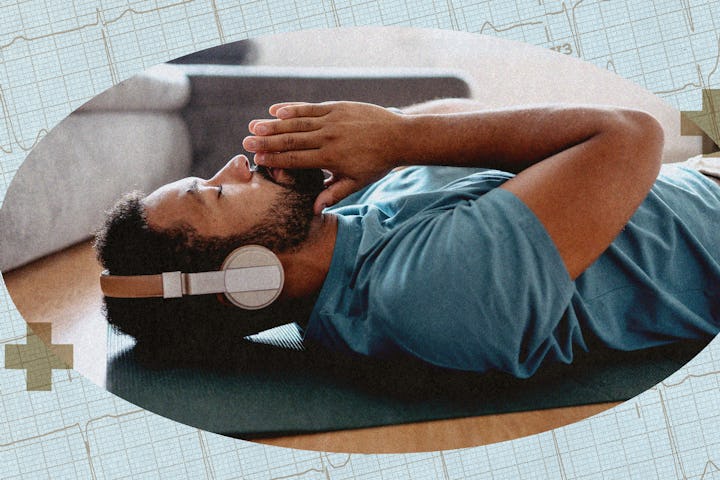This 20-Minute Mindfulness Practice Is The Key To Better Sleep
And it’s done lying down.

When you think of yoga, you likely think of deep breaths and even deeper stretches. But the popular yoga nidra doesn’t require body movement at all. Rather, it’s a meditative experience focused on achieving a relaxed state that hovers somewhere between sleep and wake. If you have trouble sleeping or deal with brain fog, new research shows it might offer the help you’ve been seeking.
Yoga nidra is a meditative practice where you lay flat on your back while being guided through a series of instructions. The instructions aim to help you set an intention for the session, control your breathing, visualize specific parts of your body, and allow your thoughts and emotions to wander. Scientifically speaking, the sessions involve tapping into your autonomic nervous system to calm down the body. It’s very similar to meditation, but it gets you to a more relaxed state with slower brain waves. And, per the new study which was published in the journal PLOS One, even novice practitioners can achieve yoga nidra’s sleep and brain-boosting benefits.
Previous research has shown that people subjectively report better sleep and cognition after yoga nidra practice, but there’s been no objective measure of this. For the new study, researchers in India had 41 healthy young men who were beginners at the practice take a handful of cognitive tests and keep a sleep diary before and after two weeks of yoga nidra. Thirty of the men also underwent an overnight sleep study. The researchers found that after two weeks, the novice yogis had better sleep, cognition, learning, and memory.
As far as sleep benefits were concerned, researchers found that the percentage of delta waves — the slowest brain waves scientists have recorded in humans — increased in deep sleep after yoga nidra practice, meaning that all 41 men saw sleep quality increased. Improved slow-wave sleep has previously been linked to better attention, learning, memory, and performance, as well as synaptic strength. Additionally, the research team found that sleep efficiency, or how much time trying to sleep you actually spend sleeping, increased by 3.62% after a session.
In terms of brainpower, researchers observed that men were faster at every cognitive test thrown their way — with no dip in accuracy — at the end of the study period. Their accuracy also improved for tests of working memory, abstraction, fear and anger recognition, as well as spatial learning and memory. These cognitive improvements may partially be explained by improvements in sleep quality.
More research is needed to confirm these findings, particularly with a larger group of participants and a randomized control group. Future research should also investigate the effects of doing yoga nidra for more than two weeks.
However, these results, and the previous research done, speak to the potency of the practice. If you want to get started with yoga nidra, it can be done in a studio class or at home with the help of a recorded session. Session lengths vary. The practice the study participants followed lasted 20 minutes, with an additional three minutes of instruction before and after the main session. A standard session includes seven steps: preparation, samkalpa (resolution), body part awareness, breath awareness, feeling and sensation, visualization, and ending of practice. You can listen to it here:
Other guided yoga nidra practices are available on YouTube, Spotify, and meditation apps.